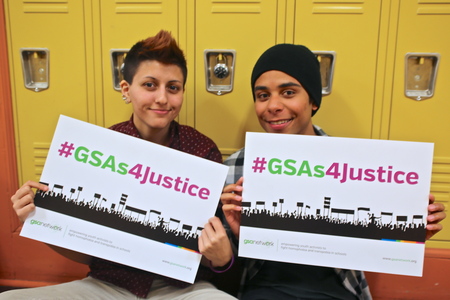To: Superintendent Heath Morrison
North Carolina Students Need Solutions: Adopt Restorative Practices
This campaign has ended.

All young people should have the opportunity to go to school, be themselves, and graduate. In order to keep ourselves and fellow students in school, we demand that MECKLENBURG COUNTY implement restorative practices, as outlined in the "Restorative Practices: Fostering Healthy Relationships & Promoting Positive Discipline in Schools" toolkit for educators and administrators.
Why is this important?
In November 2013, Jewlyes Gutierrez, a transgender girl from California, was outrageously charged with assault for defending herself against bullying at school. A year earlier, Dynasty Young in Indiana was expelled for bringing a stun gun to school in self-defense after enduring months of harassment based on his sexual orientation and gender expression.
Jewlyes, Dynasty, LGBTQ youth, and all students deserve better. Our district can -- and must -- take action now to make sure our students are never put in a similar position.
We often hear about bullying in schools, but the anti-bullying and zero tolerance policies adopted in response pose just as much of a danger for LGBTQ youth of color. Together, hostile school environments and extreme disciplinary policies create a school-to-prison pipeline for youth of color, youth with disabilities, and LGBTQ youth, telling them that their lives are disposable and that simply trying to get an education carries a risk of jail time. LGBTQ youth make up just 5-7% of the youth population, but represent 15% of those in the juvenile justice system.
Exclusionary practices (like suspensions and expulsions) hurt all students' ability to succeed and achieve their academic goals and dreams. We believe restorative justice practices are the best solution for school discipline problems involving bias-based bullying and harassment, because they allow schools to address the root problems behind bullying and harmful behavior.
In January, the Obama administration released guidelines for improving school climate and discipline. Those guidelines recommend best practices like restorative approaches and condemn punitive policies and court referrals. It has been proven that alternative discipline with non-punitive approaches provides better student outcomes and keeps the student community together. In March 2014, the National Education Association, the American Federation of Teachers, the Opportunity to Learn Campaign, and the Advancement Project jointly released a toolkit highlighting restorative approaches as a best practice and providing guidance to administrators and educators on implementing them.
In order to keep ourselves and fellow students in school, we demand that restorative justice practices, as outlined in the "Restorative Practices: Fostering Healthy Relationships & Promoting Positive Discipline in Schools" toolkit, be implemented in our district.
Jewlyes, Dynasty, LGBTQ youth, and all students deserve better. Our district can -- and must -- take action now to make sure our students are never put in a similar position.
We often hear about bullying in schools, but the anti-bullying and zero tolerance policies adopted in response pose just as much of a danger for LGBTQ youth of color. Together, hostile school environments and extreme disciplinary policies create a school-to-prison pipeline for youth of color, youth with disabilities, and LGBTQ youth, telling them that their lives are disposable and that simply trying to get an education carries a risk of jail time. LGBTQ youth make up just 5-7% of the youth population, but represent 15% of those in the juvenile justice system.
Exclusionary practices (like suspensions and expulsions) hurt all students' ability to succeed and achieve their academic goals and dreams. We believe restorative justice practices are the best solution for school discipline problems involving bias-based bullying and harassment, because they allow schools to address the root problems behind bullying and harmful behavior.
In January, the Obama administration released guidelines for improving school climate and discipline. Those guidelines recommend best practices like restorative approaches and condemn punitive policies and court referrals. It has been proven that alternative discipline with non-punitive approaches provides better student outcomes and keeps the student community together. In March 2014, the National Education Association, the American Federation of Teachers, the Opportunity to Learn Campaign, and the Advancement Project jointly released a toolkit highlighting restorative approaches as a best practice and providing guidance to administrators and educators on implementing them.
In order to keep ourselves and fellow students in school, we demand that restorative justice practices, as outlined in the "Restorative Practices: Fostering Healthy Relationships & Promoting Positive Discipline in Schools" toolkit, be implemented in our district.
.png)

